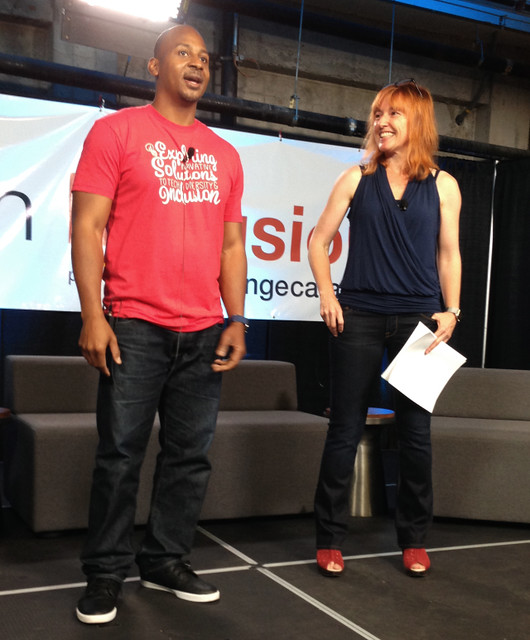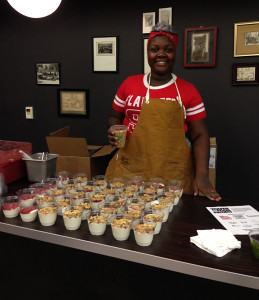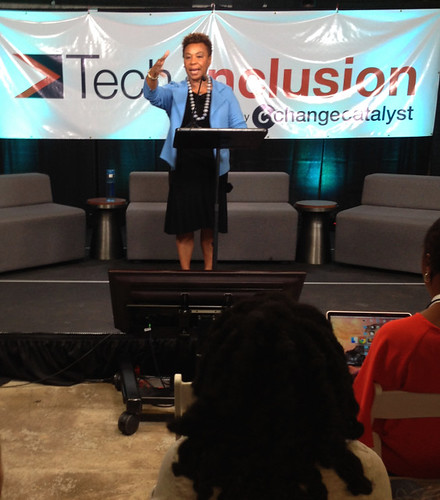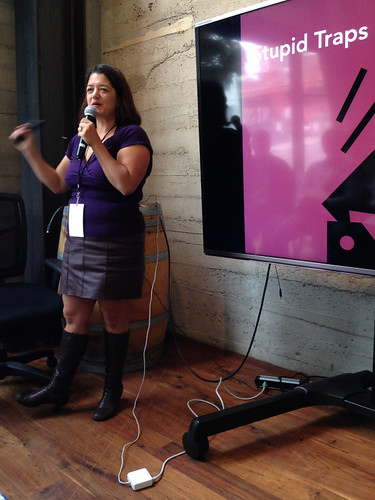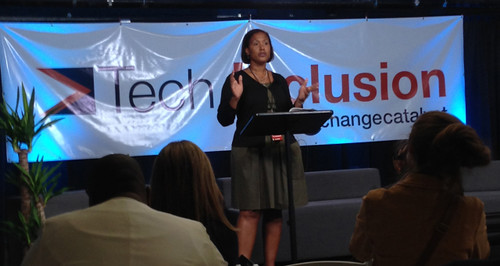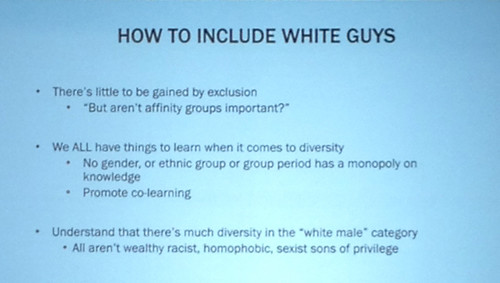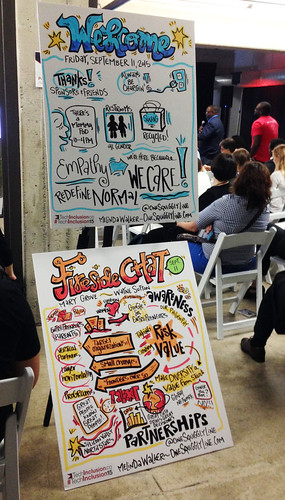Everyone!
Written by Lorien Smyer
This past weekend, thanks to a scholarship from Women Who Code, I was able to attend the first ever Tech Inclusion Conference, held at Galvanize in San Francisco.
I found it to be an exhilarating experience, and judging by the energy and enthusiasm of others in attendance, I was not alone.
As stated on the Tech Inclusion website, the purpose of the conference was to:
“Learn what’s currently being done around tech diversity and inclusion, discuss initiatives that have worked – and those that haven’t – plus explore new solutions together. This conference is for the whole tech community: engineers and designers, entrepreneurs and policymakers, university faculty and corporate executives… of every race, gender, age, ability and geography.”
There were multiple events happening simultaneously throughout the conference, so I wasn’t able to attend everything, but highlights of the conference included:
The Welcome Talks
On Friday, Tech Inclusion Founders Wayne Sutton and
Melinda Epler warmly welcomed us all to the conference, and filled us in on the inclusive amenities, such as the “mommy pod” for nursing mothers, the “all gender” bathrooms, the ASL interpreters and volunteer guides available when needed, the code of conduct, and the local, women-owned catering companies The Town Kitchen and Mamacitas Cafe.
Panel Discussions
The Workplace Diversity and Inclusion panel members discussed ways in which their companies are addressing the challenge to diversify. Sometimes employees themselves are pushing for change, such as Rachel Williams’ diversity council, and Anitra Collins’ employee resource group. Companies are also examining their own processes; Abby Maldonado mentioned Pinterest’s evaluation of their hiring funnel.
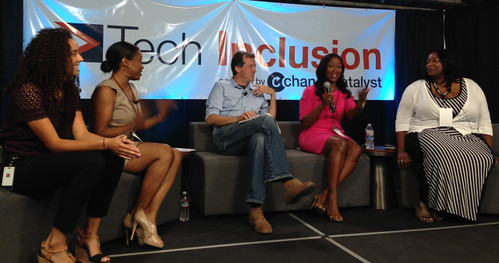
Abby Maldonado, Anitra Collins, Jon Swartz, Rachel Williams, and Tarsha McCormick on the Workplace Diversity and Inclusion panel
At the Developing Citywide Tech Ecosystems panel, Konda Mason mentioned the good news that an anonymous donor has recently given $34 million dollars to Oakland, specifically earmarked for certain organizations in many areas, with $4 million to be shared among seven technology programs, including Black Girls Code and Hack the Hood.
At the panel on Life as a Diverse Engineer, Alex Tabony bluntly stated “I’m half blind and half deaf”, and said that he is “very well trained in overcoming problems that most people aren’t even aware of”. Leslie Miley of Twitter discussed being his authentic self at work; “to let people know that these are my stories”. Leah McGowen-Hare stressed how important role models are: “it’s hard to be something that you can’t see”.
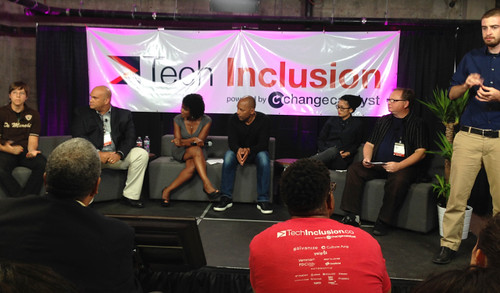
Lucy Mendel, Levon Lloyd, Leah McGowen-Hare, Leslie Miley, Dom DeGuzman, Alex Tabony, and ASL interpreter, during the Life as a Diverse Engineer panel
At The Role of Employee Resource Groups in Creating Inclusion panel,
Jeff Gilmore of Facebook pointed out that it’s not a charity case to hire a veteran, and that support is needed: for example, Facebook hierarchy is flat, but the military is not, so orientation, one on one mentorships, and happy hours are important. Multiple panel members stressed the importance of getting support for Employee Resource Groups (informal groups that can be a driving force for change) from other areas of the company; specifically, multiple executive sponsors, support from legal and HR departments, partnering with other teams to supplement budgets, and involving managers (so there is no perception that you’re not doing your full job).
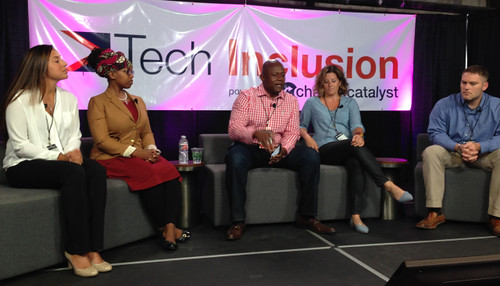
Nancy Torres, Ayori Selassie, Michael DeFlorimonte, Beth Bachrach, and Jeff Gilmore on the The Role of Employee Resource Groups in Creating Inclusion panel
Workshops
The Establishing Best Practices in Workplace Diversity & Inclusion workshop had attendees discuss points of action: confront the brutal facts; declare yourself (what does your company stand for?); create a disciplined plan; education network, and put in the work.
At the
Resume workshop, Cindy Alvarez of Microsoft’s
Yammer social network gave tips on how to get results with your resume: leave off your address (so hiring manager won’t think you live too far to commute, or be influenced by what neighborhood you live in), and consider adding your nickname, or even phonetic spelling, if your name is unusual (so hiring manager won’t be dissuaded from calling you by the fear of mangling your name).
She also stressed the importance of networking; that the best way to get your resume taken seriously is to have an employee of the company refer you. Ms. Alvarez also pointed out that what any company wants to know is how you fill the unique-shaped hole on their team: let them know what you can do for them, but don’t tell them the obvious things about your job (except as keywords at the bottom); tell them the impressive things about you that your current boss will be upset to lose when you leave.
Solo Talks
Civil litigator Danielle Ochs discussed How to Ensure your Company Provides Equal Pay. She covered in detail the
Equal Pay Act and Title VII.
Eric Abrams of UC Berkeley talked about “Big Tent Diversity”: including everyone, specifically, not leaving out “straight, cisgendered white guys”.
The Career Fair
A significant highlight of the conference was the Career Fair, which was free, and included companies large and small, from Facebook to Livid, all open to increasing diversity at their companies. Over 600 people registered for the career fair. As an about to graduate “bootcamp” student, and a woman over 50, I felt encouraged by the company representatives I spoke with, and left the fair with numerous business cards.
There were many other amazing panels, workshops, and solo talks, but this post is getting quite long, so I’ll wrap up with a few other points of interest:
The Reverend Jesse Jackson’s
Rainbow PUSH Coalition was mentioned multiple times throughout the conference. Most moving to me was hearing Rachel Williams of Yelp speaking at the Workplace Diversity and Inclusion panel about how Jesse Jackson helped her get her job.
Melinda Walker of One Squiggly Line
added a unique multimedia aspect to the conference, by drawing graphics illustrating various workshops and panels.
It was impressive to me that people came from all over the United States, and from as far away as the U.K. and Africa, to attend the conference. There were more people that wanted to attend that weren’t able to (because of space considerations); the organizers plan to release videos from the event.
Hopefully, there will be more events like this one. Even more hopefully, there will be a day in the not too distant future when they aren’t needed.
